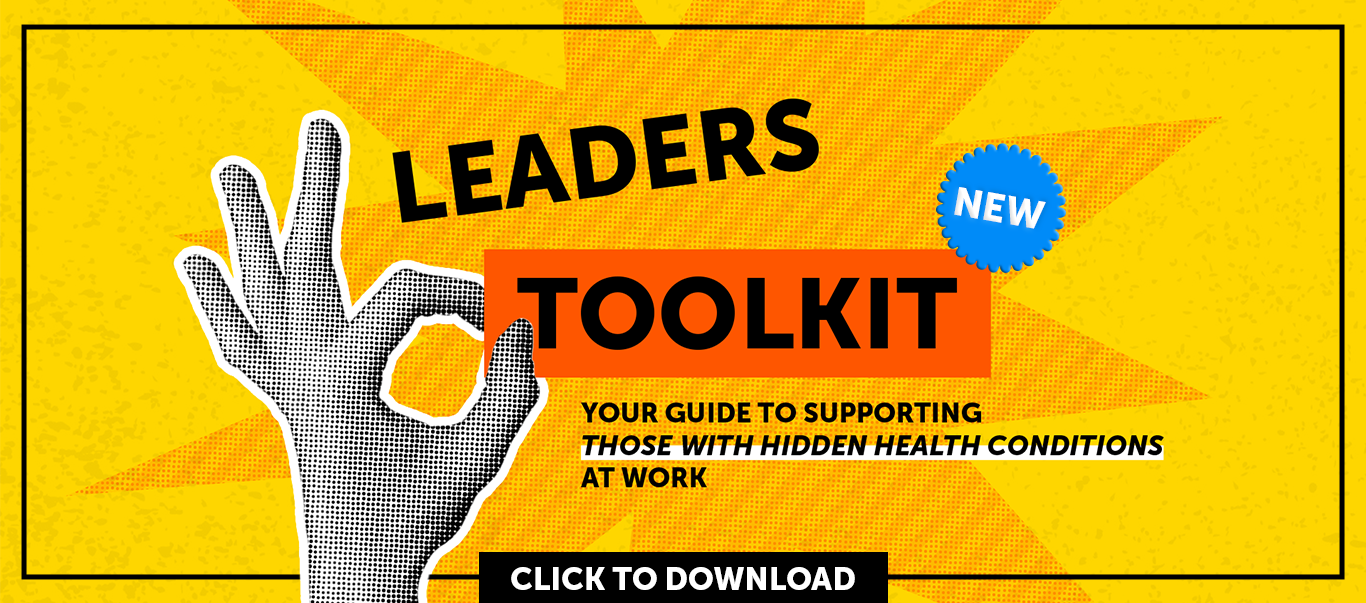September 4th, 2023
London
Believe Their Pain
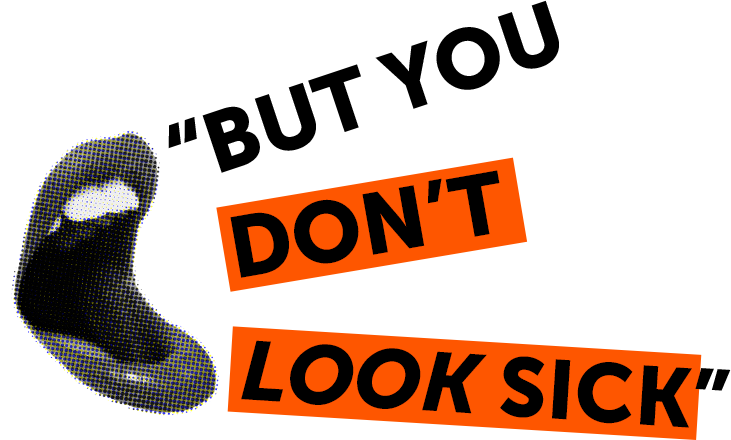
It’s an unacceptable truth; women and non-binary people’s pain is not taken seriously.
8 out of 10 women¹ in the UK feel they are not listened to by healthcare professionals – an experience of institutionalised sexism – which permeates culture, society and the workplace.
Research shows women are more likely than men to be affected by chronic pain. In these instances women generally experience more recurrent pain, more severe pain, and longer lasting pain², yet women’s pain is routinely disbelieved³ and less likely to be treated⁴ because of damaging gender stereotypes. As Anushay Hossain, author of ‘The Pain Gap’ says “There’s a pain gap, but there’s also a credibility gap. Women are not believed about their bodies — period.”⁵
A SheSays study into hidden illness and disability in the creative industry, revealed 83% of women and non-binary employees with an invisible health challenge or disability have actively chosen not to disclose it at work.
Why? Fear of prejudice and discrimination.
62% actively hide their pain for fear of prejudice at work and 52% believe it could limit promotion and other opportunities for progress, if employers found out.
Like all systemic inequalities, it’s only by allyship that this issue can be tackled. At SheSays we believe the first step is listening. When people tell us of their invisible illness, disability or other health challenge, we need to BELIEVE THEM.
The SheSays Believe Their Pain campaign is in partnership with JCDecaux Community Channel, to bring the grim reality of disclosure to the streets, and social feeds, across the UK – driving the need for belief and a change in outcomes.
Below are three easy steps to advocate for those with hidden pain, illness and disability – as well as additional resources to further support allyship or those affected.
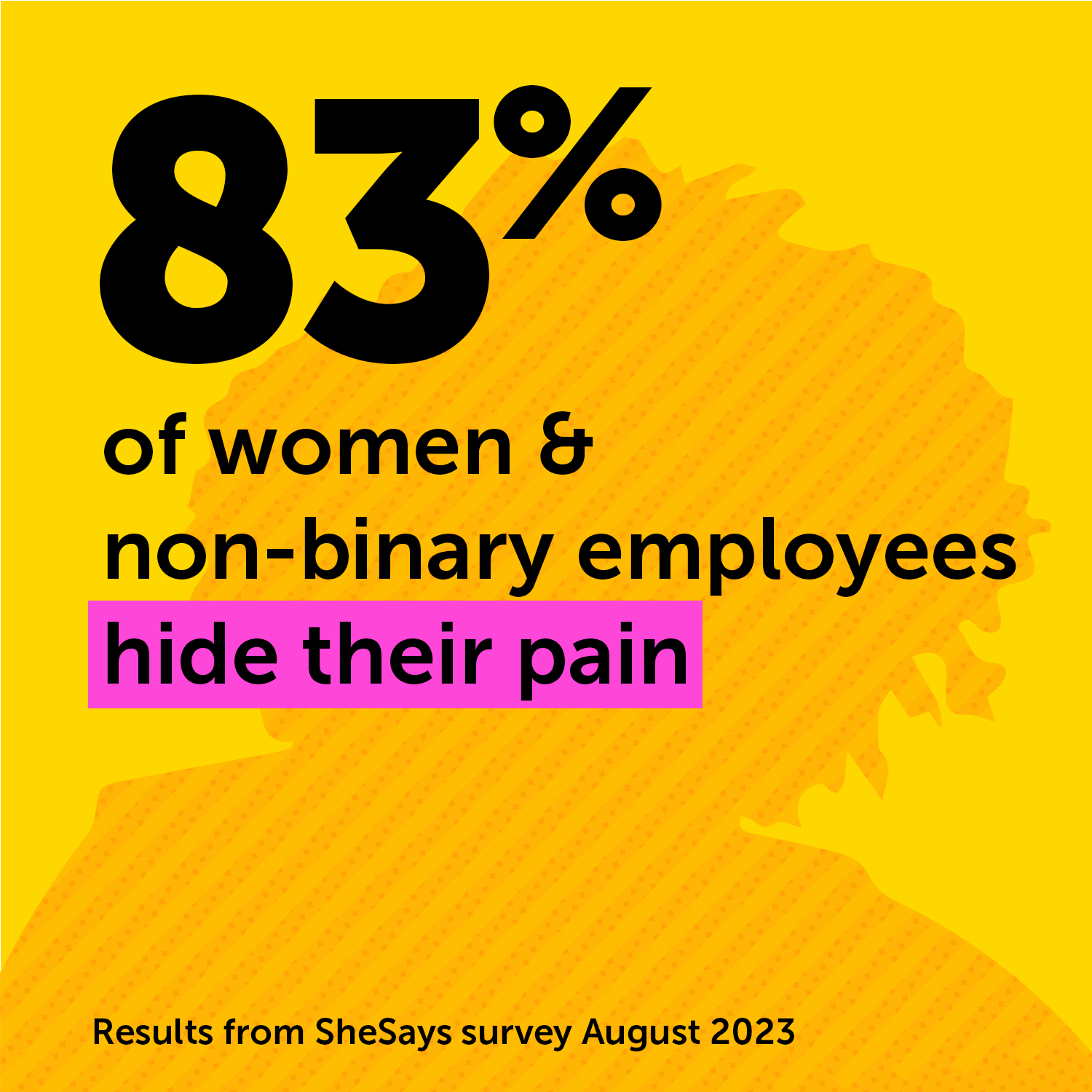
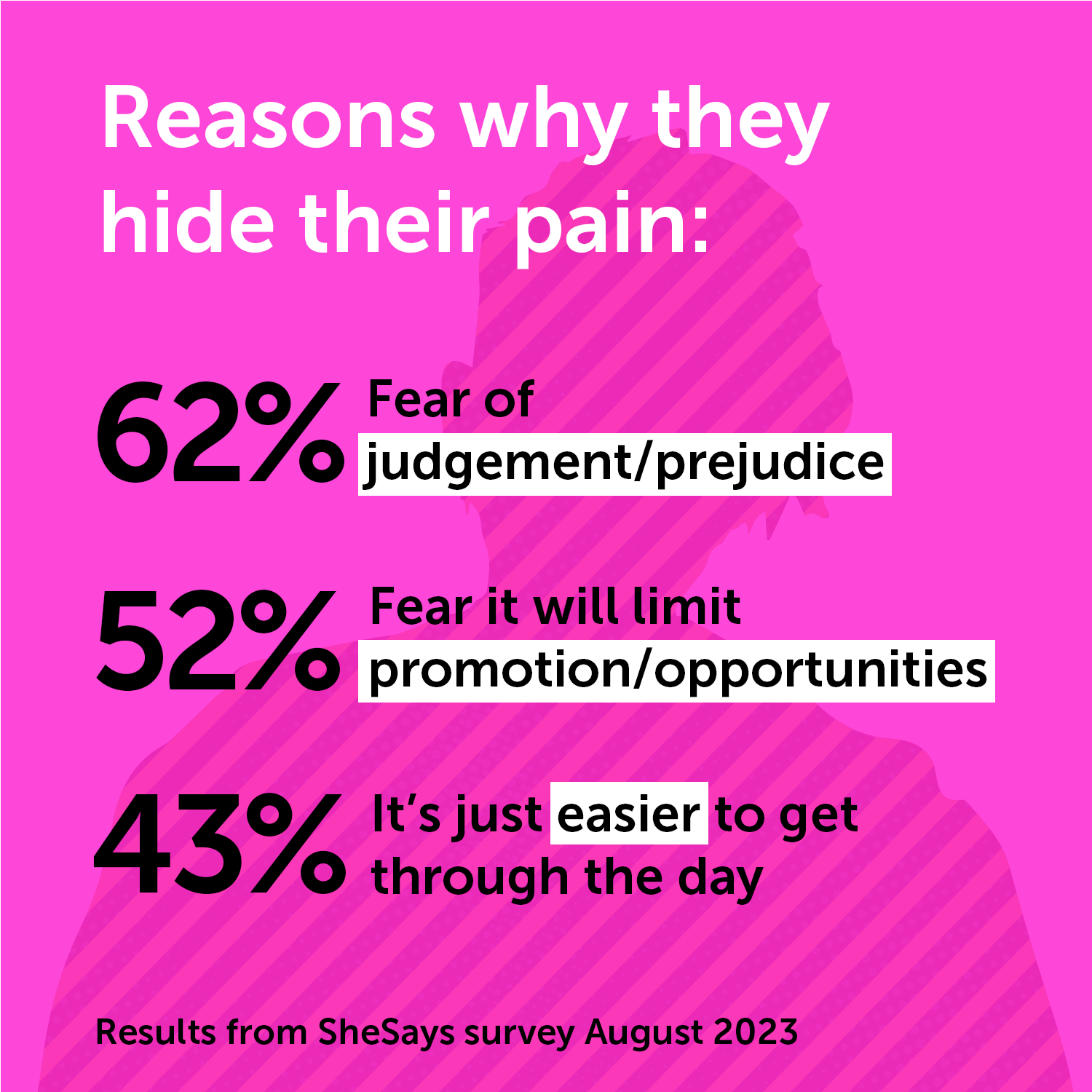
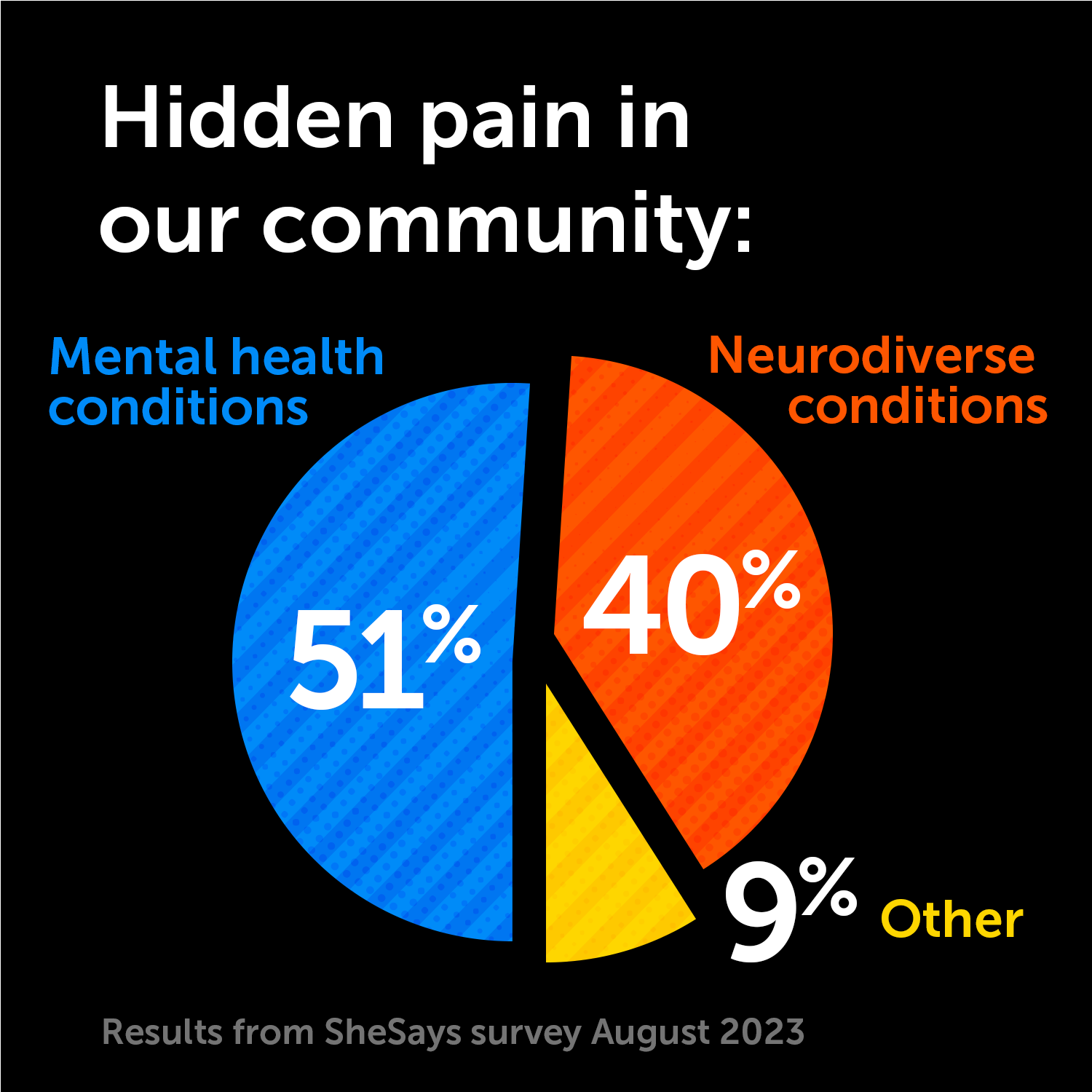
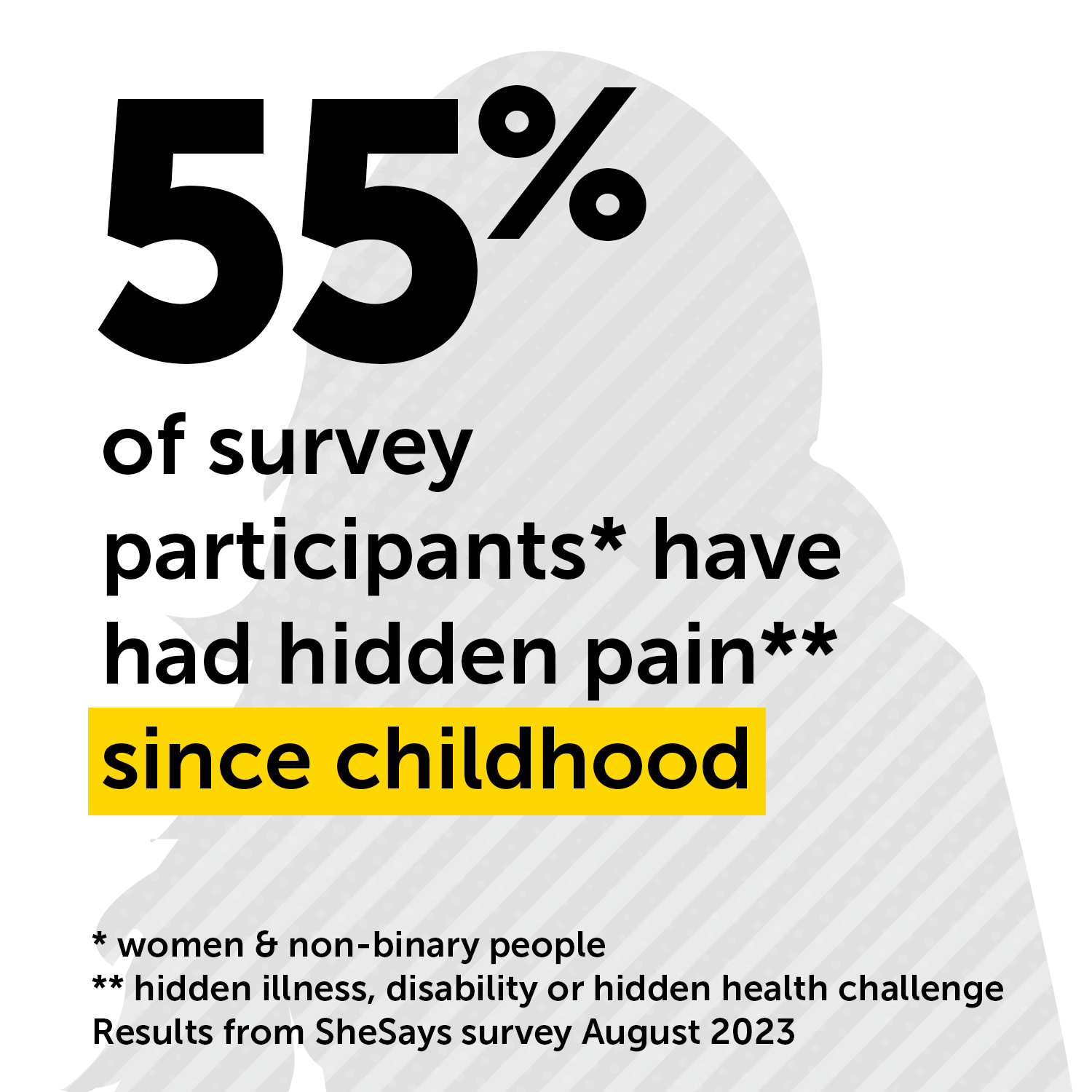
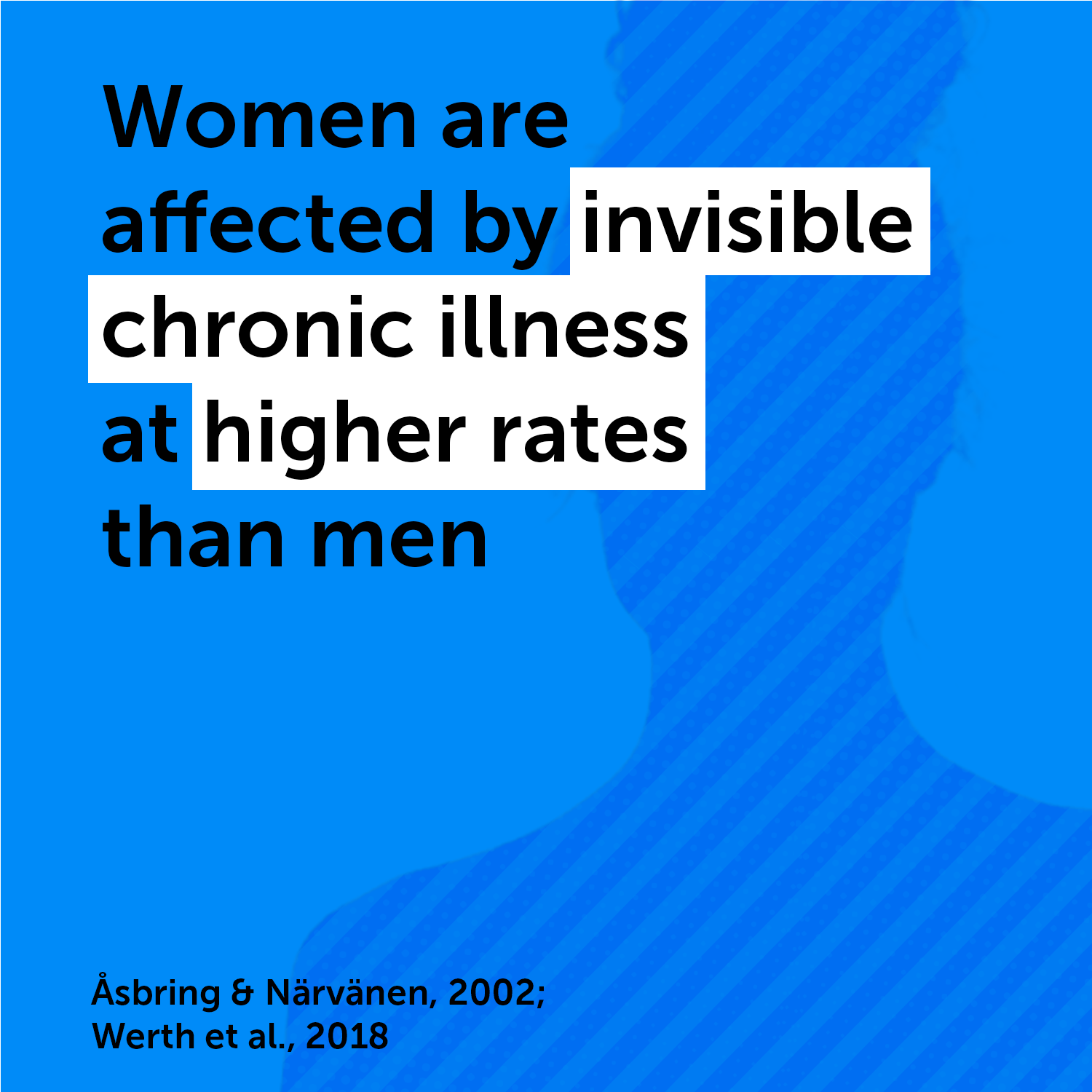
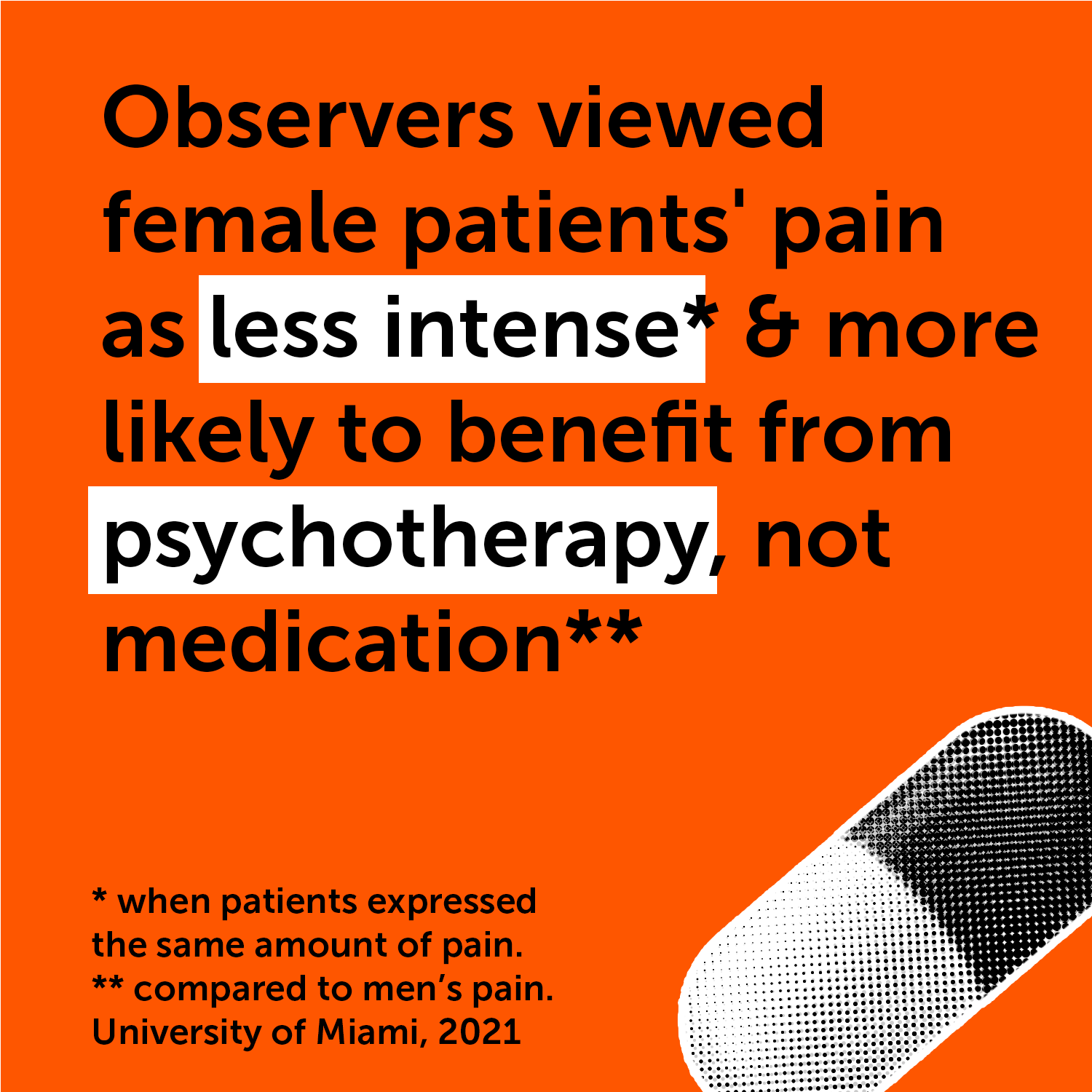
Three simple steps to become an advocate for hidden pain
Believe them
Believe them
1 in 2 women said their pain had been dismissed because of their gender⁶.
Those who experience misogyny face bias and discrimination at every stage of disclosing hidden health concerns, from medical professionals to colleagues and friends, so the first step is to believe them and encourage others to believe them.
Educate yourself
Educate yourself
Often the responsibility of educating unaffected people falls on those being discriminated against, which can be exhausting, alienating, and even dangerous.
Let’s not put any more pressure on those affected to educate us. We need to be responsible for our own education, especially when things do not affect us directly, so we can fight against unconscious bias and make workplaces a safer and more inclusive environment for everyone.
Advocate for them
Advocate for them
We want everyone to become a visible ally for an invisible issue.
People with hidden health conditions and disabilities often face discrimination and stigma – so speaking up can be challenging. If you can say something or change something at your work, you should. We all need to advocate for each other.
Create positive change in your workplace
Download our Leaders Toolkit – your guide to supporting those with hidden health conditions at work. It’s a 10 minute read.
…But if you have only 30 seconds, try the below…
To encourage inclusivity for all, including people experiencing invisible pain, SheSays suggest workplaces should:
Allow flexible working; hours and logistics.
This will help address those with care duties, reduce stress, and allow for those navigating illness or disability.
Implement training to address unconscious bias and empower managers to handle complex subjects effectively and with emotional intelligence.
Foster an inclusive culture with open discussion and visible comms that drive change.
Include tailored/gender-specific workplace considerations, from policies to health and safety risk assessments:
- Ensure your environment supports the needs of women and non-binary people (e.g. spatial freedom for a pregnant person using a bathroom cubicle)
- Have gynaecological health policies
- Employee benefits should also cater to women (e.g. Private healthcare with fertility treatment and menopause support)
- Parent and carer policies
Employ listening methods to gather insights from employees around needs.
Ensure employees have a safe, easy, and internally publicised way to request reasonable adjustments.
Join networks and initiatives that drive change towards equality to build a more inclusive culture.
In addition, read and implement these things:
- Understand what ‘Disability’ means. Most disability and chronic illness organisations reference the Social Model of Disability
- Are you or your employee’s or colleagues eligible for Reasonable Adjustments?
- Consider sharing your own story
- Mental Health First Aid – support resources and tools for organisations
- Train your teams in inclusive practices
- Sign your organisation up to the Valuable 500
- Sign your organisation up to the Generation Valuable programme
- Train, interact and hire with disabled-friendly platforms like Making Space
- Know how to be a Mental health Ally
- Work with neurodivergent advocates like Ellie Midds
- Keep diversity in mind at all levels, and, where appropriate, consider using agencies like Diverse models
- Consider supporting women in your workforce with health support from providers like Peppy
Sign off as an ally
Customisable email signature templates
Most professional comms still live in the dreaded inbox, so why not use your email signature to clarify your experience or allyship to your colleagues?
Copy and paste the below into your email signature, and don’t forget to customise as much as you want.
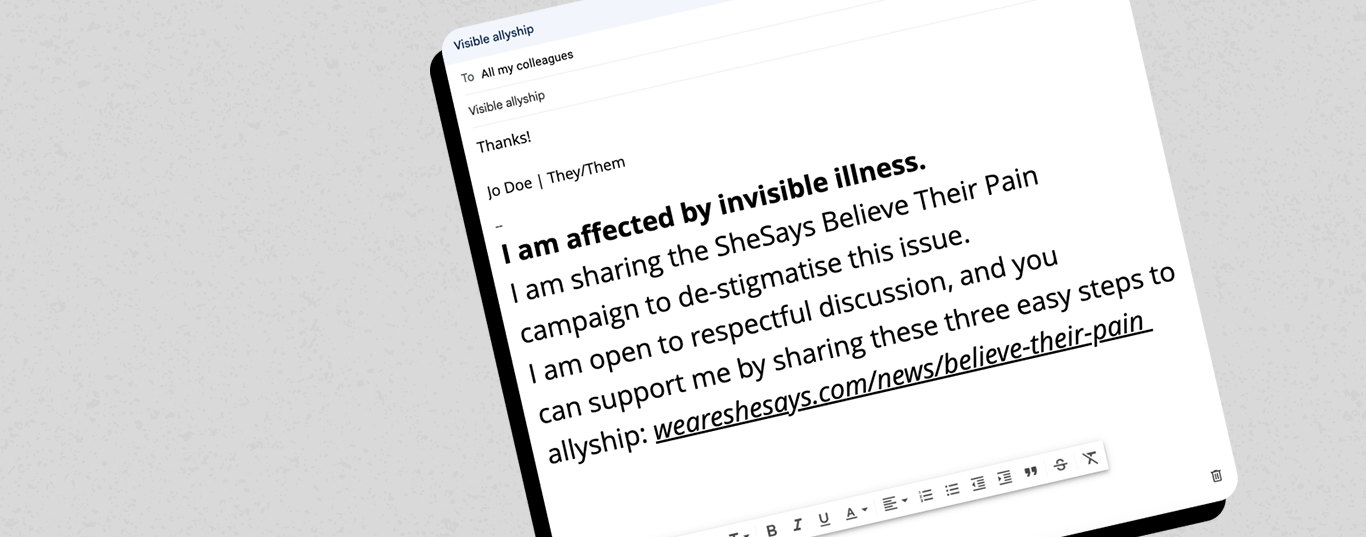
Managers:
This office believes women and non-binary people’s pain, and supports those with invisible health conditions and disabilities. If this affects you, I am here to listen.
Allies:
I believe women and non-binary people’s pain, and support those with invisible health conditions and disabilities so I am [sharing these three easy steps to allyship] OR [educating myself, and I welcome the opinions of those affected].
For those who wish to disclose and discuss:
I am affected by an invisible [health condition] OR [disability]. [I am sharing the SheSays #BelieveTheirPain campaign to de-stigmatise this issue and am open to respectful discussion in this office.] OR [you can support me by sharing these three easy steps to allyship.]
Out of Office for those affected:
This office supports those with invisible health conditions and disabilities. I [work from home] to support my needs and [may be a little slower at replying to emails this week]. Thank you for your understanding.
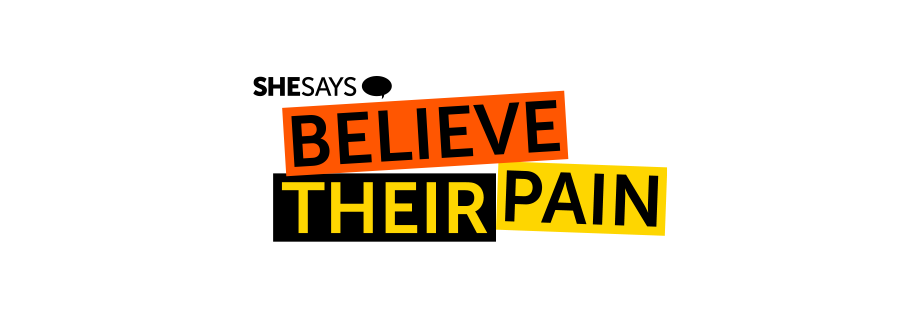
Ignorance is not bliss
Start your journey with some of our picks below…
Listens
- The Retrievals – a podcast from the New York Times exploring dismissed pain during the course of fertility treatment
- At Your Cervix – a podcast dedicated to women’s health issues such as incontinence, pelvic pain and sexual dysfunction
- The Hurt – a podcast from The Female Pain Docs unpacking disease and ailments affecting women and non-binary people
- My Experience of Being Autistic – an episode from The Maisie Hill Experience podcast, charting Maisie’s personal journey with autism
- Visible Women – a podcast from Author Caroline Craido Perez, driving action to close the gender data-gap
- Access All; Disability News and Mental Health – a podcast sharing life stories and solutions with a friendly touch
- Disabled and Proud – a podcast by top adaptive athlete Brooke Millhouse bringing a different perspective on disability
- Chronically Complex: An M.E action podcast
- Why We Need a Mental Health Rebellion – a podcast episode from the Slo Mo podcast by Mo Gawdat
Reads
- The Collected Schizophrenias: Essays – a book of essays by Esmé Weijun Wang unpacking her experience of mental and chronic illness
- Invisible Women – a book by Caroline Craido Perez exposing data bias
- Medical Herstory – a blog eliminating sexism, shame, and stigma from health experiences
- Driving Forwards; journey of resilience and empowerment after life-changing injury – a book by Sophie Morgan
- Female Factor: Making Women’s Health Count & What it Means for You – a book by Dr Hazel Wallace
- Women at Work; A Global Outlook – a recent report from Deloitte
- Why Women Around The World Go To Work With Period Pain – an article from Vitals by Daye
- Women’s Health At Work – Challenges And Solutions – a report from Bupa
- The Menopause; A Looming Disability For Half The Population – a blog post from LSE
- Cream Crackered – a blog by freelance disabled writer Lorna McFindlow, on chronic illness and disability rights
Watch and follow
- Sophie Jayne Butler, Video Essays and Commentary 26-year-old disabled queer Londoner Sophie, deconstructs topics, to understand the world Youtube & Instagram
- Alice Ella Content creator giving the ‘Dislaybled’ body confidence Instagram
- Sophie Morgan TV Host, Producer, Writer and Entrepreneur advocating for disability rights. See ‘Beyond Barriers’ column for Conde Nast Traveller. She is Co-Founder @_making_space__ and Founder @RightsOnFlights Instagram
- Keeley Cat-Wells Disability rights Activist, Founder and CEO at career advancement platform Making Space. Follow on Linkedin
- You Look Okay To Me an online space for chronic illness with video essays on illness, culture and identity Youtube Instagram
- Ellie Middleton Autistic ADHDer, Penguin Life Author and TEDx Speaker on LinkedIn & Instagram
- Crip Cramp, a Disability Revolution on Netflix
- The Mind Explained by Vox Netflix
- Diagnosis from the NYT Netflix
- Unrest a film on M.E by Jennifer Brea
- Afflicted on Netflix
- My Beautiful Broken Brain on Netflix
- Gaga: Five Foot Two on Netflix
- In a Different Key on Amazon
- Disability and Me on BBC Iplayer
- Don’t Take My Baby on BBC Iplayer
- Talk Disability on BBC Iplayer
- Disability & Abortion on BBC Iplayer
- Davina McCall: Sex, Mind and the Menopause on BBC Iplayer
- Davina McCall’s Pill Revolution on BBC Iplayer
- Women’s Health: Breaking the Taboos on Channel 5
Know your rights, your community and more
Resources for those affected
What to do at work
- Government guidelines on taking sick leave + what to do if unfairly dismissed
- National Insurance and sick pay rights – including where to get help and time off for a sick dependant
- On un-masking and getting comfortable being yourself (it’s general advice but still a useful read) plus this article for neurodivergent people
- Valla can affordably help you represent yourself at an employment tribunal and more
- How to request reasonable adjustments
- Some people find apps like Tiimo helpful for planning their day
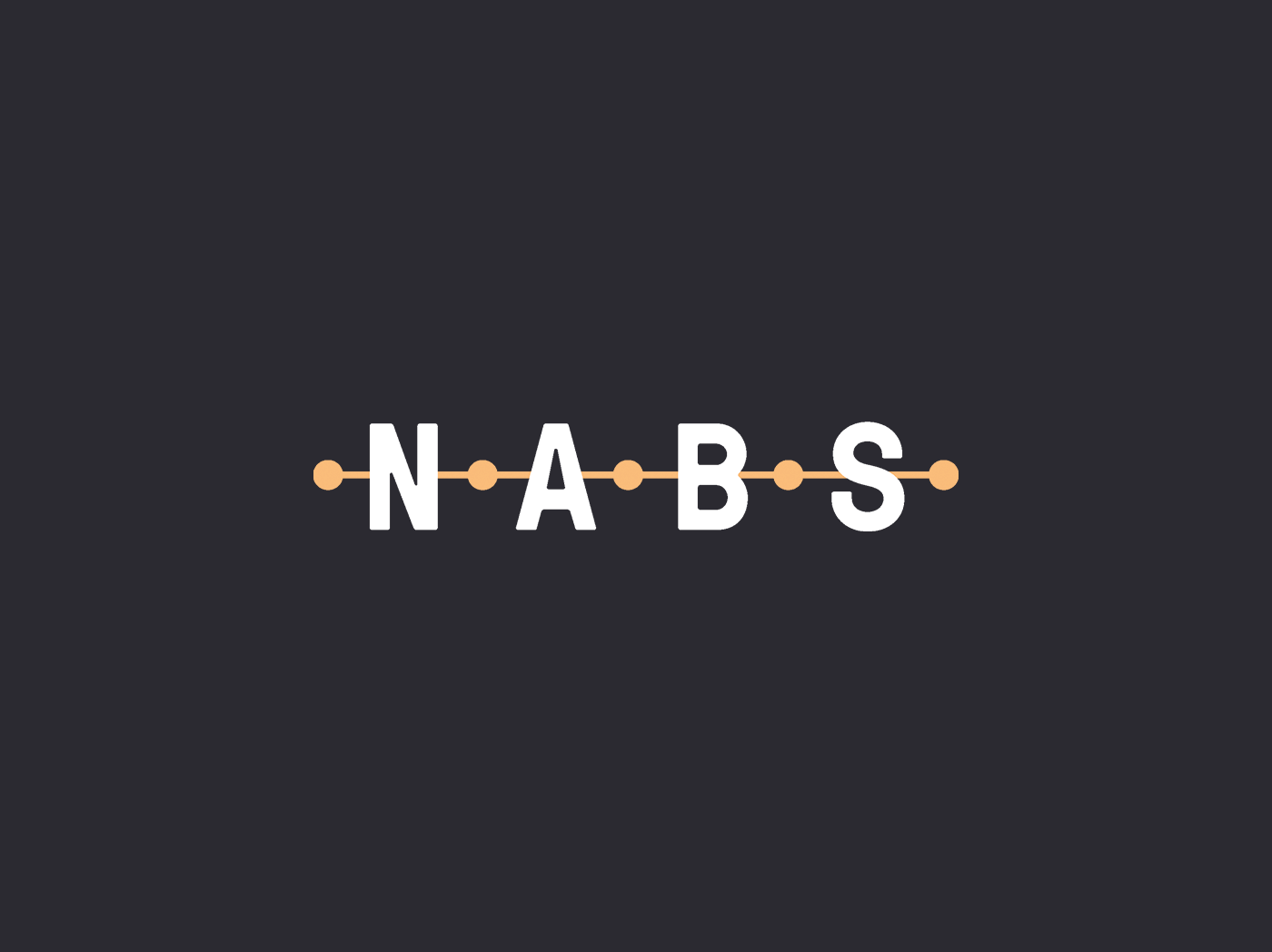
If you’re navigating health challenges at work, contact NABS on 0800 707 6607 and speak to their Support Team for a confidential, compassionate and informative chat (available to those working in, or who previously spent a substantial amount of their career working in the UK advertising, media and marketing industry).
Community groups for support and rest
- Hub of Hope – Mental Health Support Network – a database of services
- Black Women Rising – for cancer support
- Therapy – for black people
- SWANA Mental Wellness – for women and LGBTQIA+
- Still Chill – mental health service
- Black Girls Hike – community for black women and non-binary people
- Muslim Hikers – community for muslim hikers
- Misery Party – mental health collective & sober night club by and for queer/trans/nb BPOC
- Wild in the City – community gatherings in nature to have fun, learn and feel good.
- Flock Together – bird watching for people of colour
- Peaks of Colour – nature healing club for people of colour
- We go outside too – nature based mental and physical well-being community
- Support for those with ME/CFS
- Join a disability friendly community like The Other Girls Club
Learning
- What happened to you?: Conversations on Trauma, Resilience, and Healing a book by Bruce D. Perry and Oprah Winfrey about the effect of adverse childhood experiences on our personalities and our behaviours, whilst being a powerful predictor of our risk for physical and mental health problems later in life.
- What My Bones Know: A Memoir of Healing from Complex Trauma a book by Stephanie Foo
- Black Ballad health awareness for Black women and non-binary people
- Menopause whilst Black a podcast centering the menopausal experience of Black UK based women, by sharing their stories.
- Period Power: Harness Your Hormones and Get Your Cycle Working For You a book by Maisie Hill
- Perimenopause Power: Navigating your hormones on the journey to menopause a book by Maisie Hill
- The Aram Newsletter an exploration of joy, love and what’s bringing ease to women of colour and Muslim women.
- The Happiness Lab a podcast by Dr Laurie Santos
